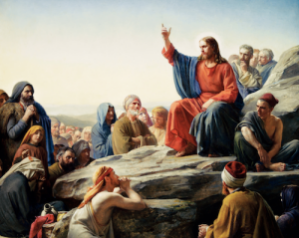Robert King (e-watchman)
When Is “Then”?
Commentary on the Daily Text: Thursday, July 21 2016
People will hand you over to tribulation and will kill you, and you will be hated by all the nations.—Matt. 24:9.
As followers of Christ and Witnesses of Jehovah, we are persecuted in nations around the world. This is to be expected. In the face of such hatred, however, we endure in the Kingdom-preaching work and continue to prove ourselves holy before Jehovah. Although we are honest, clean-living, and law-abiding citizens, why are we so hated? (Rom. 13:1-7) Because we have made Jehovah our Sovereign Lord! We render sacred service to “him alone” and will never compromise on his righteous laws and principles. (Matt. 4:10) We are also “no part of the world.” Therefore, we are neutral with regard to the world’s wars and political affairs. (John 15:18-21; Isa. 2:4) If we are focused on God’s sovereignty and we trust in him, nobody can cause us to compromise and be ensnared by cowardly fear.—Prov. 29:25. w14 11/15 3:8-10
In some respects the institution of the Watchtower is like an overly protective parent who would lie to their children to protect them from the harsh realities of life. So it is, that, Jehovah’s Witnesses are told by “mother” that this is as bad as it gets. And like a parent telling an embellished bedtime story, the Watchtower has convinced Jehovah’s Witnesses that the great dragon has already been thrown from heaven and in a rage he ruthlessly persecuted the Bible Students —even throwing the leaders of the Watchtower in prison. Jehovah’s two anointed witnesses were killed by the dastardly enemy, who rejoiced over their demise.
There is no question that Jehovah’s Witnesses are one of the most hated religious groups in the world. But to my knowledge not a single witness or Bible Student has ever been killed by persecutors in the United States —not so much as one. True, back in the 30’s and 40’s a few were arrested and some even beaten by enraged mobs. Hundreds of children were expelled from school for not placing their right hand upon their heart and pledging their allegiance. A couple of JW’s in Texas suffered the indignity of being tarred and feathered. Many hundreds of men have done prison time for their refusal to be conscripted into military service. Still, no American Jehovah’s Witnesses have been killed. That is a good thing.
But it does present a problem, because Jesus said you will be handed over to tribulation and be killed. Is it just JW’s who lived long ago in nations that were ruled by tyrants who experience tribulation and are killed — like Hitler’s Nazi Germany or the former USSR?
It certainly seems odd that if Satan was cast down in 1914 and went off to wage war upon those who have the work of bearing witness to Jesus that he would not focus his opposition upon the nation where the witness bearers are most concentrated and where the work originates and from where it is directed. Yet, Jehovah’s Witnesses have thrived in America. Not only that, but because of the relative peace and prosperity that has existed since the last World War thousands of Gilead trained American missionaries have gone to the far corners of the earth to preach the good news.
Notice the day’s verse again (20 July 2016). There is a little word that the Daily Text omitted. Jesus actually said: “Then people will hand you over to tribulation and will kill you, and you will be hated by all the nations on account of my name.”
Little words can have great meaning. The question is, when is then? To answer that question consider the next verse. It says: “Then, too, many will be stumbled and will betray one another and will hate one another. Many false prophets will arise and mislead many; and because of the increasing of lawlessness, the love of the greater number will grow cold. But the one who has endured to the end will be saved. And this good news of the Kingdom will be preached in all the inhabited earth for a witness to all the nations, and then the end will come.”
The adverb “then” denotes an ordering, a sequence of events. Previously in context Jesus said that nations and kingdoms would go to war. There will be food shortages, pandemics and then…
So, after the great eruption then the persecution begins. Then many will be stumbled and hate one another. And then the end will come, after the good news has been preached. However, although you may have have read these verses in Mathew many times, or the versions of Jesus’ words as recorded by Luke and Mark, there is likely a very important detail that you have overlooked. What is that?
Mark’s account of Jesus’ prophecy is a bit more detailed as regards the tribulation and persecution that Christians are destined to suffer. After describing the beginning pangs of distress, the wars, etc., Jesus said: “As for you, look out for yourselves. People will hand you over to local courts, and you will be beaten in synagogues and be put on the stand before governors and kings for my sake, for a witness to them. Also, in all the nations, the good news has to be preached first.”
Whereas, Matthew wrote that the good news will be preached in all the earth and then the end will come, Mark wrote that the good news has to be preached first. The question is, first before what? In context it is first, before people hand you over to tribulation, as Matthew said, and as Mark said in more detail, handed over to local courts —to stand before governors and kings.
This means that the good news is preached before Christians are handed over to tribulation to be killed. What it really means is that the good news is preached in all the earth before nations and kingdoms are thrown into tumult. It is preached before the wars and food shortages and pestilence claim hundreds of millions of lives.
The reason Jehovah’s Witnesses have enjoyed such a prolonged period of peace is because Satan and the demons have not been cast down. But when they are, then is when “people will hand you over to tribulation and will kill you, and you will be hated by all the nations.”
Of course, Jehovah’s Witnesses could never come to this realization on their own. And we may be certain the Watchtower will never let go of 1914. However, reality is certain to intervene. When the bombs and missiles begin flying then Jehovah’s Witnesses will wake up – at least those who are not stumbled by the unexpected coming of Christ like a thief in the night.

